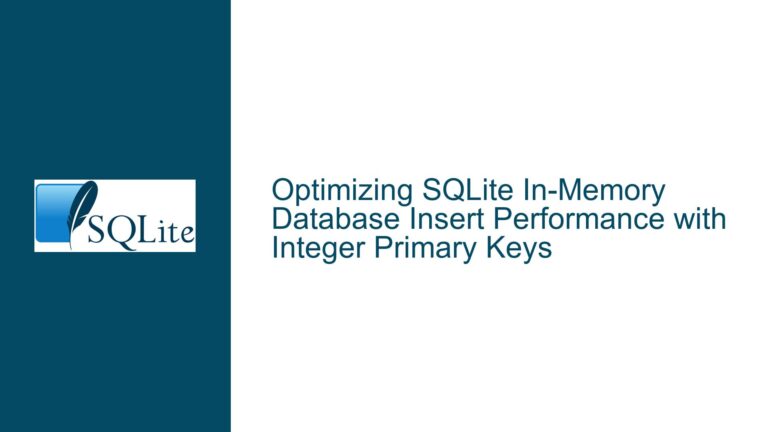Dynamic Column Weight Calculation in SQLite FTS5 Using Custom Functions
Dynamic Weight Adjustment Based on Directory Hierarchy in FTS5
The core issue revolves around dynamically adjusting the weight of search results in SQLite’s FTS5 (Full-Text Search) based on the directory hierarchy level where a search term is found. The goal is to assign higher weights to terms found in deeper directory levels, under the assumption that these terms are more specific and relevant. For example, a search term like "painting" found in /gaming/painting/airbrush should carry more weight than the same term found in /gaming/painting or /news. This dynamic weighting is not natively supported by FTS5’s built-in bm25 function, which assigns static weights to columns.
The challenge lies in implementing a mechanism that can interpret the directory hierarchy level of a search result and adjust the weight accordingly. This requires a deeper understanding of FTS5’s custom auxiliary functions and how they can be leveraged to access row-specific data, such as the URI path, to calculate dynamic weights. The solution must also consider performance implications, as accessing additional table data during the scoring process can introduce inefficiencies.
Custom FTS5 Functions and Row-Specific Data Access
One of the primary causes of the issue is the static nature of FTS5’s built-in bm25 function, which does not support dynamic weight adjustments based on row-specific data. The bm25 function assigns weights to columns at query time, but these weights are fixed and cannot be modified based on the context of the search result, such as the directory hierarchy level.
To address this limitation, custom FTS5 auxiliary functions must be implemented. These functions can access row-specific data, such as the URI path, and use this information to calculate dynamic weights. However, accessing row-specific data during the scoring process can introduce performance overhead, as it requires additional table lookups. This is particularly problematic in large datasets where the scoring function is invoked frequently.
Another consideration is the need to encode directory hierarchy information in a way that minimizes performance impact. One approach is to encode the directory level in the 64-bit rowid of the FTS5 table, which can be accessed efficiently without requiring additional table lookups. This approach requires careful design to ensure that the directory level can be extracted and used in the custom scoring function.
Implementing Custom Scoring Functions with Efficient Data Encoding
To implement dynamic weight adjustment in FTS5, a custom scoring function must be created. This function will access the URI path and directory hierarchy level for each search result and calculate a dynamic weight based on these factors. The following steps outline the process:
Define the Custom Scoring Function: The custom scoring function must be implemented as an SQLite scalar user function. This function will take the URI path and directory level as inputs and return a dynamic weight. The function can be written in C or another language supported by SQLite’s extension mechanism.
Encode Directory Hierarchy Information: To minimize performance overhead, the directory hierarchy level should be encoded in the 64-bit rowid of the FTS5 table. This can be achieved by reserving a portion of the rowid to store the directory level. For example, the upper 16 bits of the rowid could be used to store the directory level, while the remaining 48 bits store the unique identifier for the row.
Access Row-Specific Data in the Custom Function: The custom scoring function must extract the directory level from the rowid and use it to calculate the dynamic weight. The URI path can be accessed using the FTS5 auxiliary function API, which allows the function to read any column of the current row.
Optimize for Efficient Query Execution: To ensure efficient query execution, the custom scoring function should be designed to minimize the number of table lookups. This can be achieved by encoding as much information as possible in the rowid and avoiding unnecessary data access.
Integrate the Custom Function into FTS5 Queries: Once the custom scoring function is implemented, it can be integrated into FTS5 queries using the
ORDER BYclause. For example, the query could useORDER BY custom_scoring_function()to sort results based on the dynamic weights calculated by the custom function.
The following table summarizes the key components of the solution:
| Component | Description |
|---|---|
| Custom Scoring Function | SQLite scalar user function that calculates dynamic weights based on directory hierarchy level. |
| Directory Level Encoding | Encoding of directory hierarchy level in the 64-bit rowid of the FTS5 table. |
| FTS5 Auxiliary Function API | API used by the custom function to access row-specific data, such as the URI path. |
| Query Optimization | Techniques to minimize performance overhead, such as encoding directory level in rowid. |
By following these steps, it is possible to implement dynamic weight adjustment in FTS5 based on directory hierarchy level. This approach leverages custom auxiliary functions and efficient data encoding to achieve the desired functionality while minimizing performance impact. The result is a more sophisticated search feature that can prioritize results based on their specificity and relevance within the directory hierarchy.






